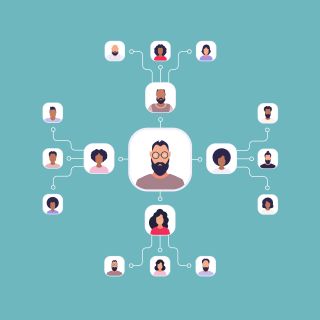Anxiety
Gamete Donors Connecting With Offspring and Their Families
Barriers: the perception of rejection, worry, fear, and other concerns.
Posted May 30, 2024 Reviewed by Jessica Schrader
Key points
- Donors may feel shame or embarrassment about donating, which may have kept them from talking with family.
- Donors may fear rejection or worry about how connecting may affect their family relationships.
- Donors may have difficulty navigating connecting with offspring and balancing the needs of everyone involved.

Most egg and sperm donors are told that they will remain anonymous, either for 18 years or forever. Since the first donor-conceived teen identified his biological father via a commercial DNA test in 20051,2, this promised/mandated anonymity has become virtually impossible. Additionally, thousands of donors have chosen to initiate mutual consent contact on the Donor Sibling Registry. Many donors are happy to have contact with donor-conceived people (and their families if the children are under 18), but others may feel overwhelmed or struggle with the idea of connecting with genetic progeny.
Donor's considerations
Did I make the right choice? Even with good intentions, donors can grapple with self-doubt, wondering if their decision ultimately caused emotional strain for the child or their current (or future) family.
Will the child ever want to know me? This question can weigh heavily on donors. Donors might worry that the children conceived with their genetic material might reject them, feel uncomfortable about the circumstances of their conception, not have family support, or not understand what this kind of relationship might look like. Fear of rejection is a significant emotional concern for many egg/sperm donors and can keep them from reaching out, connecting, and exploring new relationships.
Will I be seen as a replacement parent? Some donors worry that their role will be misunderstood, fearing they'll be seen as a competitor to the parents and therefore rejected by them. Some parents, quite often the non-biological parent, can feel insecure about their parentage or worry about not being a "perfect" parent and fear the donor replacing them in some way.
Will parents or offspring be angry with me? Parents or the resulting children might have negative feelings or blame them if there is a medical/genetic issue that the donor wasn't honest about when donating or that was unknown at the time and has presented later in life.
Do I have any rights or responsibilities? Donors may fear legal or financial repercussions if they respond to contact requests.
How will others view my donating history? Donors may fear social repercussions, stigma, or scrutiny from family, friends, or workmates.
These concerns can lead to emotional turmoil, including guilt, anxiety, and regret. Additionally, donors may struggle to define their role in the lives of donor-conceived individuals, especially when faced with the prospect of numerous offspring.
Donors may:
- Feel embarrassment or shame about donation. This may have kept them from disclosing to their family. Additionally, they might worry about having to disclose that they donated to more than one (or many) facilities.
- Be fearful about disclosing to their partners that they not only donated gametes but also have biological children as a result of their donations. The fear of judgment by partners, family members, or others due to their history of selling their gametes can be significant.
- Feel overwhelmed with the prospect of a large group of progeny. Half-sibling groups of more than 100 and even over 200 are common with sperm donation. Donors often have no idea how they'd find the time and energy to meet the needs of scores of offspring who may desire contact. They might worry about how to tell their parents that they may be grandparents to so many donor-conceived people. The thought of telling their children that they might have some, or many half-siblings can also be daunting.
- Worry about not being on the same page as other family members with regard to exploring new relationships,
- Feel confused about their role and how to respond to requests for contact from parents and progeny.
- Wonder how to define these new relationships, and possibly incorporate donor children into their family circles.
- Experience emotional turmoil, including guilt, anxiety, or regret, particularly if they later question the implications of their donation or the impact on the resulting offspring.
- Not know how to navigate the sometimes delicate line between privacy and secrecy; protecting their family’s privacy while removing the veil of secrecy between them and their progeny. This can be stressful as they try to balance the needs and comfort levels of everyone affected.
- Fear rejection because they feel they're not good enough, haven't accomplished enough, are not mentally or physically stable enough, are not at the “right place” in life, or don't have the emotional bandwidth to handle this uncharted connection. They may have feelings of inadequacy, or worry about being a disappointment to donor children. Often, donors are simply afraid of not being liked.
- Worry about making a connection, and then feeling ghosted. It's common for donor family members to jump in and then pull back in short order to process or deal with internal or family issues. In most cases, this time-out has nothing to do with the donor. Patience and empathy go a long way in this situation. Letting the other person know that their process and timing will be respected is crucial.
- Not be aware of the fact that if they donated through a facility, they have no legal parental rights, responsibilities, or financial obligations for the children born from their donations.
- Feel worried about revealing medical or academic/career information listed on their donor profile that may be inaccurate.
- Worry about sharing/updating their own or their family's new medical information and learning about possible medical issues with donor offspring.
Finding support and moving forward
Navigating and dispelling these worries and fears can be integral to the donor-family connection process. The good news is that donors don't have to navigate these donor family complexities alone. Here are some tips to help manage fear and build meaningful connections:
- Feel your feelings. Don't bottle them up. Acknowledge any feelings of fear, anxiety, frustration, hurt, disappointment, worry, anger, or sadness.
- Be kind to yourself. Rejection doesn't define you. Practice self-compassion and avoid negative self-talk.
- If introverted or on the spectrum, communication abilities might be challenged, with difficulties in reading social cues and emotions or expressing emotional depth and breadth. Consider seeking support groups or therapists specializing in these areas to assist in your donor family outreach.
- Honesty is the best policy. It's not a matter if your family will find out, it's only a matter of when. The truth should come from you and not from a surprise DNA test result of your family member.
- Reframe your thinking. If you reached out and received a "no thank you," “go away," or no reply at all, remember that sometimes patience is needed while the families process and define this new connection/relationship. Rejection is often more about the rejector's story, emotional capabilities, and life circumstances. See rejection as a chance to reassess. Trying to understand where others are coming from is helpful.
- Focus on the positive. Remind yourself of your positive role in creating families. Remember that opening yourself up to these connections might seem risky, but can also offer more love in your life.
- Lean on your support system. Talk to friends, family, or a professional who can offer encouragement and perspective.
- Set and respect boundaries. You do have control of the situation. You get to set the boundaries that work for you and your family. Parents and donor-conceived people may also have boundaries that need to be respected. Not everyone moves at the same speed or comfort level when connecting. Have patience and meet people where they're at.
Connecting with donor-conceived people and their families can have profound emotional, psychological, and social implications for people who have sold their gametes. Open communication, honesty, education, and support networks can all be important when navigating the complexities of connecting with people who share around 50% of their DNA. Expanding one's family can be enriching for all involved.
To find a therapist, visit the Psychology Today Therapy Directory.
References
2. New Scientist Magazine, 11/3/2005. Anonymous Sperm Donor Traced on Internet.




